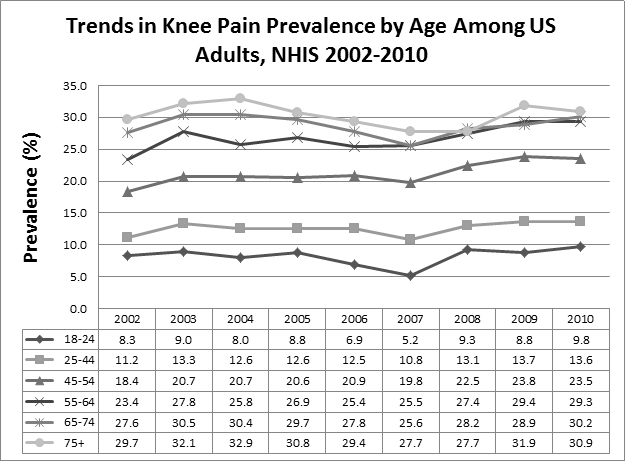Session Information
Session Type: Abstract Submissions (ARHP)
Background/Purpose: Aging of the population as well as the obesity epidemic will play a significant roll in future cases of arthritis and other lower extremity orthopedic conditions. The purpose of this study is to examine trends in the prevalence of knee pain among adults age 18 and older, overall and by age and sex.
Methods: The National Health Interview Survey, conducted annually, targets the civilian, non-institutionalized population and gathers data on a variety of health topics. From 2002 – 2010 the adult sample size ranged from 21,781 to 31,428. Adults were asked if they had joint pain in the past 30 days not including the back or neck. For those responding “yes”, respondents were then asked what joints were affected. Prevalence (%) and 95% confidence intervals (CI) of knee pain were calculated using statistical weights to account for the complex survey design. Prevalence was also stratified by age group (18-24, 25-44, 45-64, 65-74, 75+) and sex and graphed age to show trends over time. Percent increase was calculated using the formula: prevalence 2010 – prevalence 2002/prevalence 2002*100. Statistical significance was determined by non-overlapping 95% CIs.
Results: The age adjusted prevalence of knee pain increased significantly from 16.5% (CI 15.6-17.4) in 2002 to 19.6% (CI 18.5-20.7) in 2010. In each year, knee pain prevalence was higher with increasing age and highest for the 75+ age group. (Figure) More than 1 in 4 adults aged 55-64 and 65-74 and 75+ reported having knee pain each year. Knee pain prevalence increased significantly over the 9 years in all age groups. The age groups with the largest percent increase were 25-44 (21.4%), 45-64 (27.7%), and 55-64 (25.2%). Women had higher prevalence of knee pain than men for all years, but prevalence increased more in men (23.0%) versus women (15.3%).
Conclusion: Knee pain prevalence is high and has increased over time for all age groups with adults aged 25-44 and 45-64 showing the largest increases. The findings suggest a large burden of knee pain among working age adults. Public health and worksite wellness efforts should consider implementing evidence based interventions aimed at reducing knee pain such as physical therapy, aerobic and muscle strengthening exercises, and weight loss. The data also support the need for increasing the number of primary care, rheumatology and orthopedic health professionals in the workforce to be best able to address the growing burden of knee pain in the population.
Disclosure:
J. M. Hootman,
None;
C. G. Helmick,
None;
Y. M. Golightly,
None.
« Back to 2013 ACR/ARHP Annual Meeting
ACR Meeting Abstracts - https://acrabstracts.org/abstract/trends-in-prevalence-of-knee-pain-among-us-adults-national-health-interview-survey-2002-2010/

